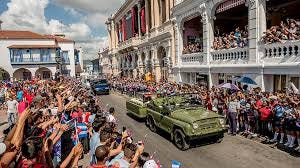The 95th anniversary of the birth of Fidel Castro
“No one has the right to lose faith in the future of humanity”
Today, August 13, 2021, is the 95th anniversary of the birth of Fidel Castro. Today’s commentary is dedicated to his life and work.
There is a tendency today to misinterpret an essential characteristic of modern revolutionary processes, namely, the emergence of charismatic leaders. The early twentieth century German sociologist Max Weber, analyzing the phenomenon of exceptional persons in a historic religious context, maintains that such persons possess charismatic authority, different from traditional authority or bureaucratic-legal authority. Appropriating Weber’s concept in observing modern revolutionary processes, we are able to discern a general pattern: the emergence of leaders with an exceptional capacity to discern and understand the unfolding of events; who possess a boundless commitment to the values of social justice; and who possess a non-institutional authority that is conferred on them by the people. The charismatic leaders of modern revolutions include Tous…


